Fact and Opinion Worksheets
Recognizing the difference between facts and opinions is a skill that is often evaluated on state reading tests. In my experience I've found that students often get confused trying to determine whether a statement is factually accurate, and that is not the skill that is evaluated. Therefore, I teach students that a fact is any statement that can be proven: "there are 10,000 feet in a mile." Even though this statement is incorrect, I teach students that this is still a fact, even though it is not true. When students define a fact as any statement that can be proven to be true or false, they will concern themselves less with whether the statement is accurate and focus more on whether each statement can be proven. Hence, they will better be able to identify facts and opinions.
I hope these worksheets and resources help you teach your students to reliably distinguish between statements of fact and opinion. Learn more about teaching fact and opinion?

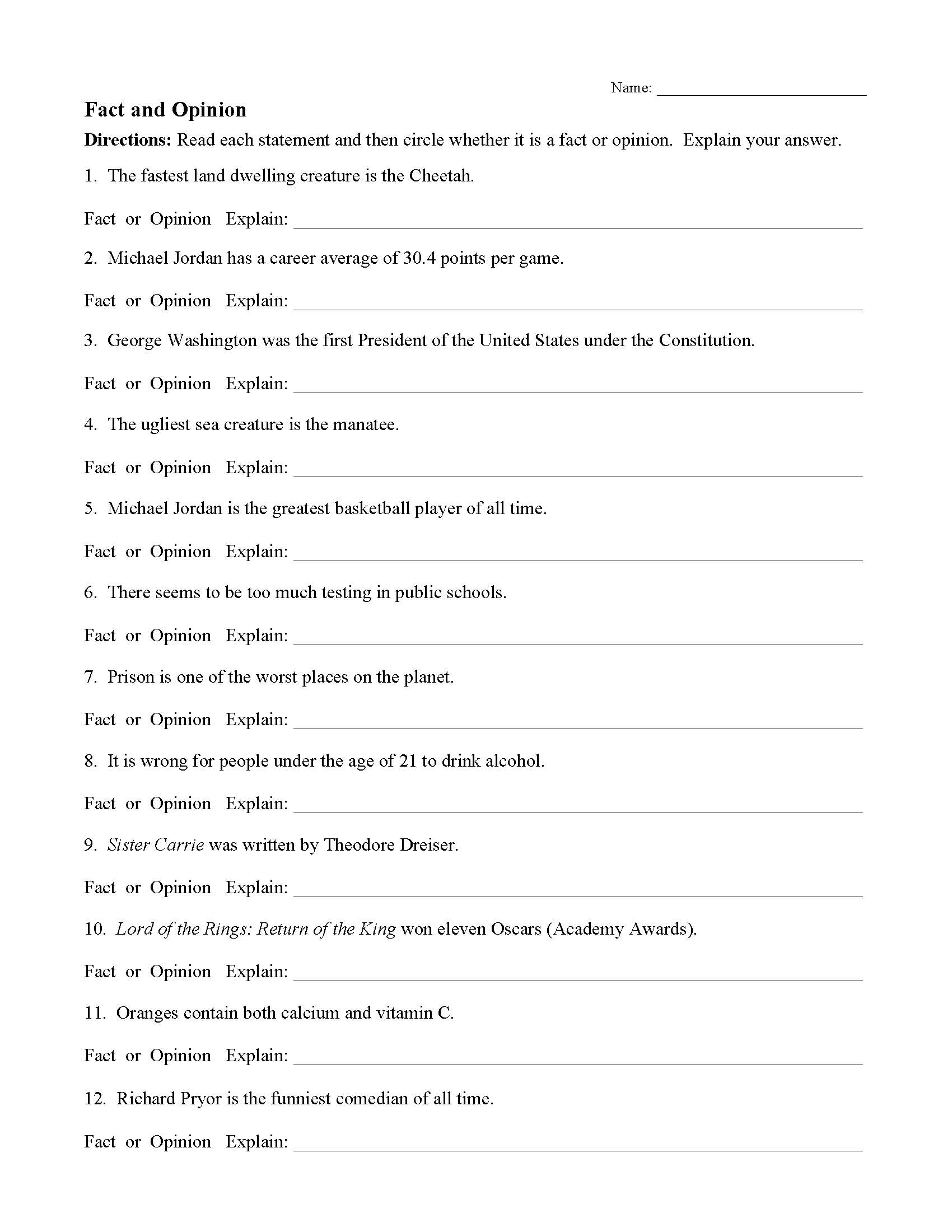
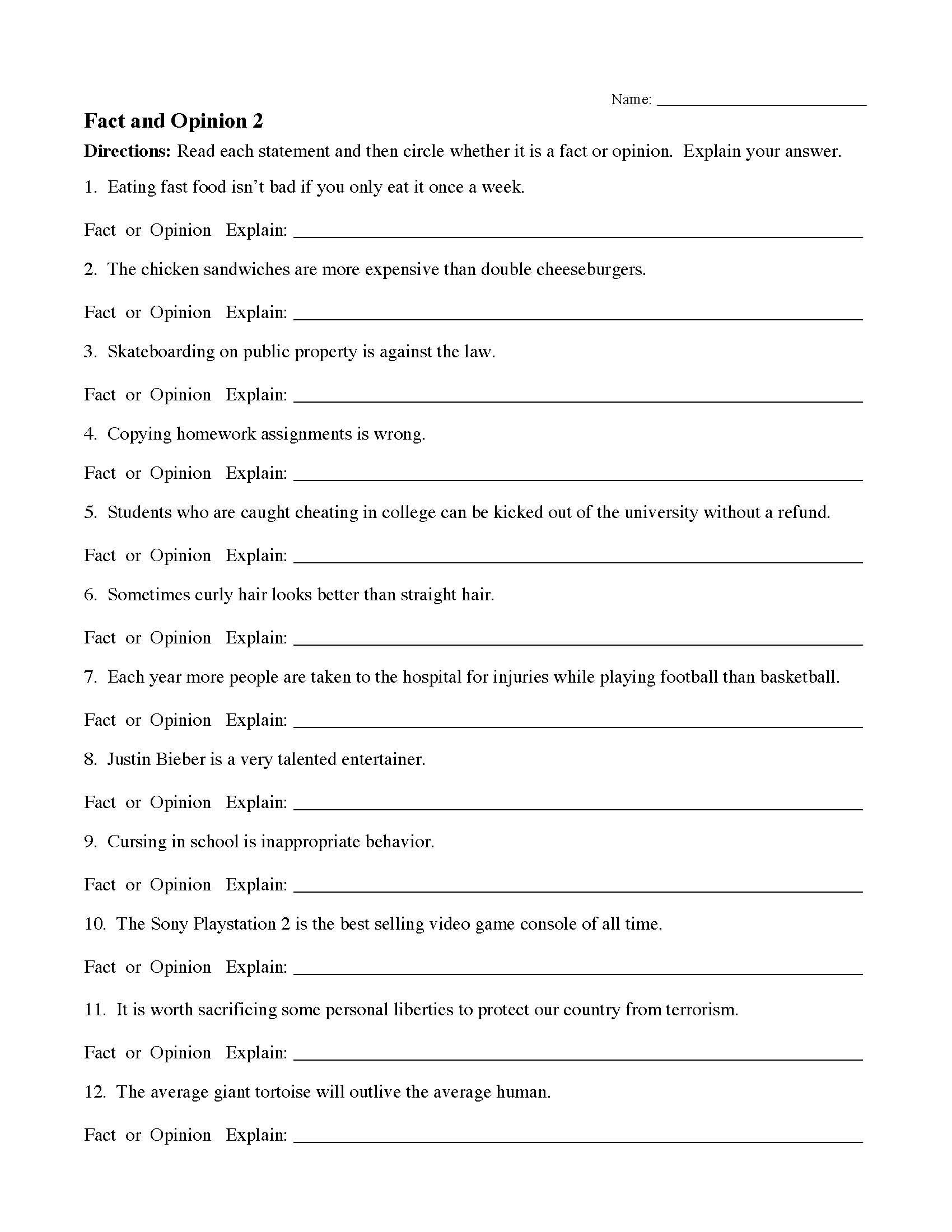
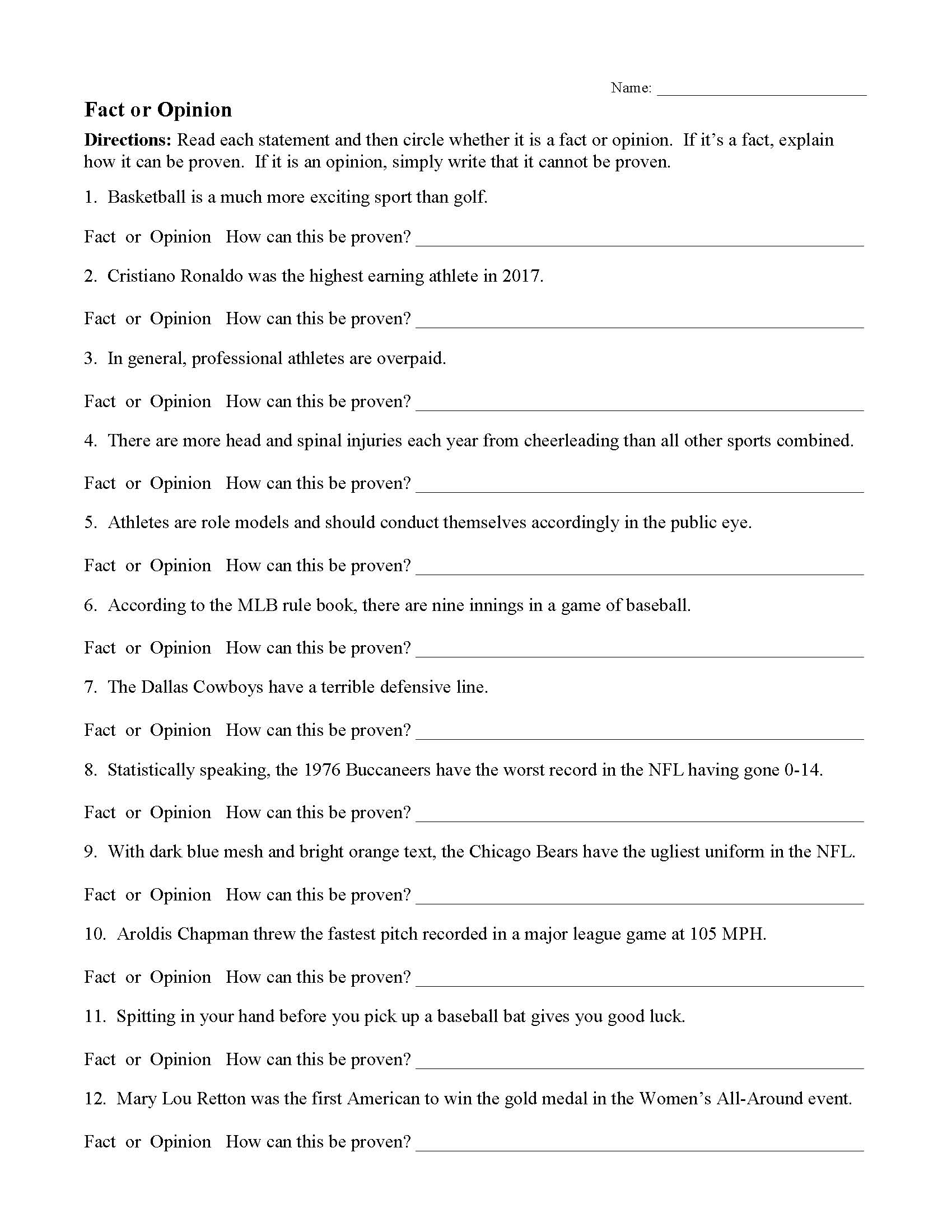
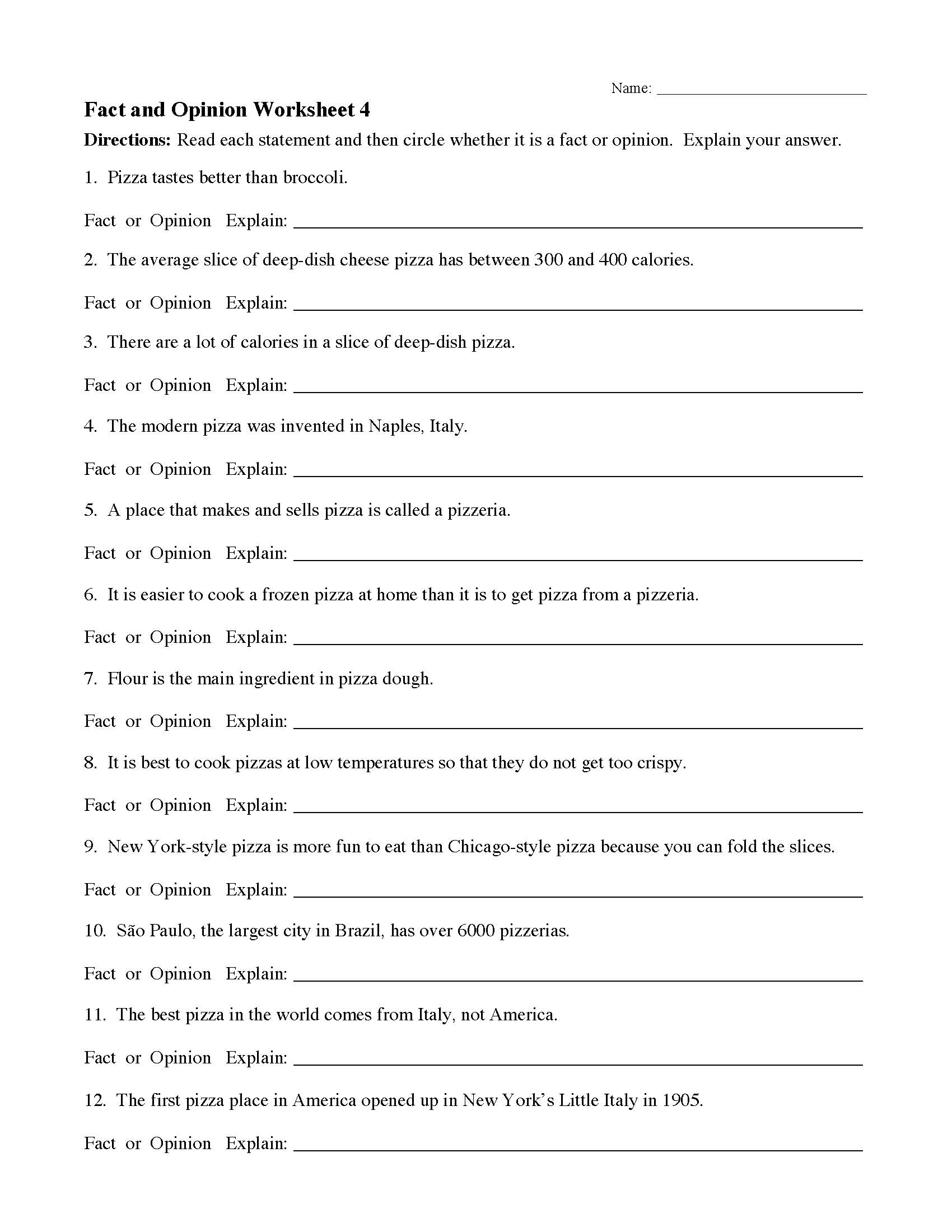
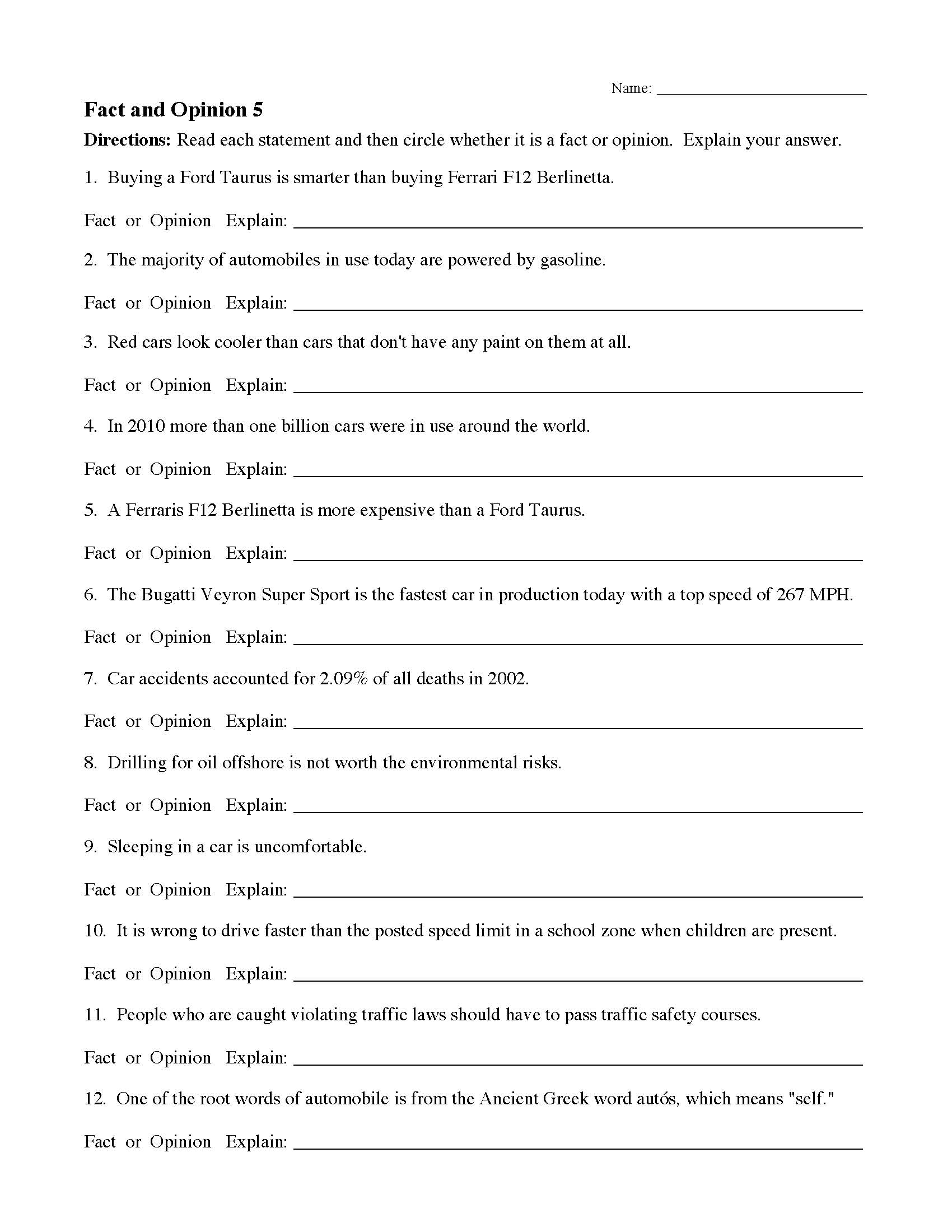
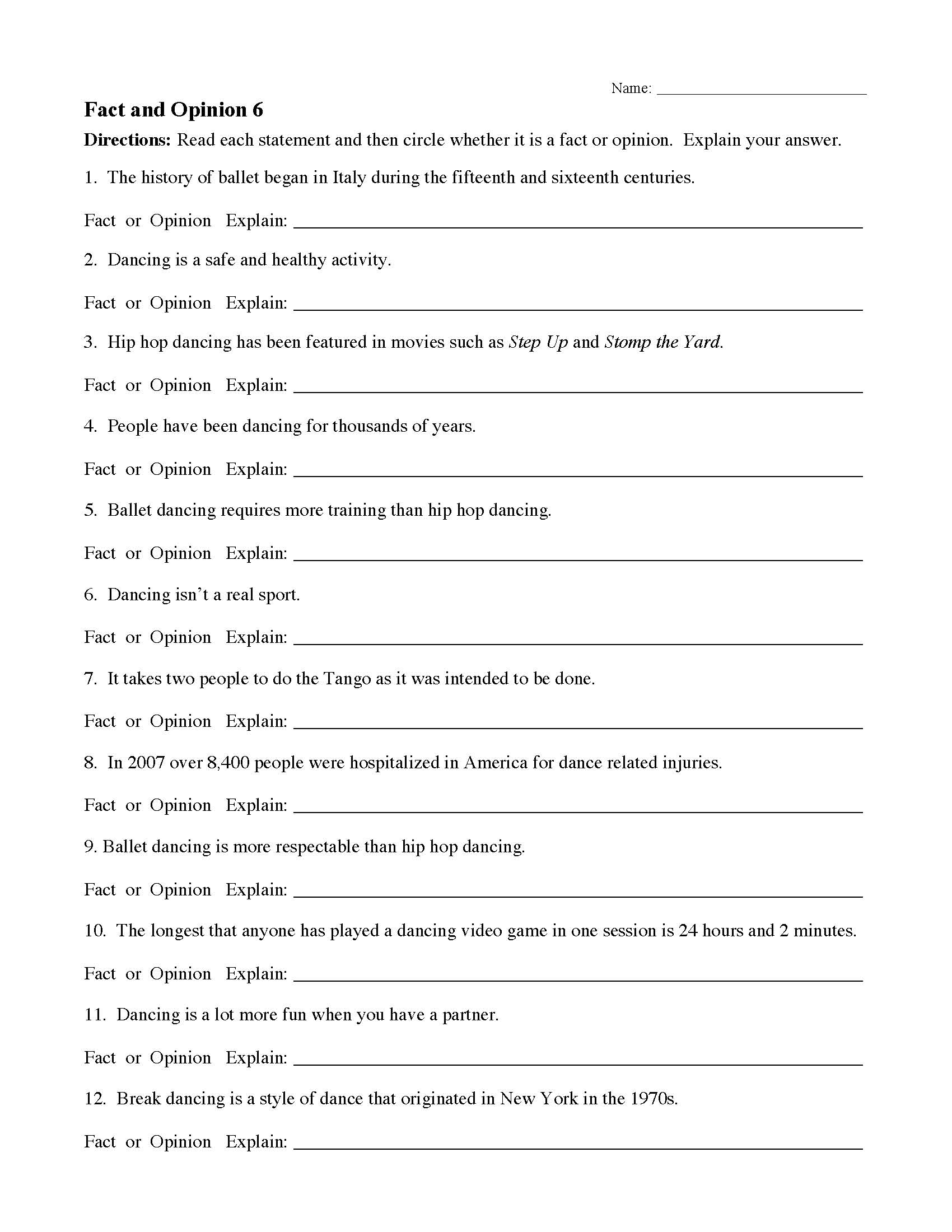
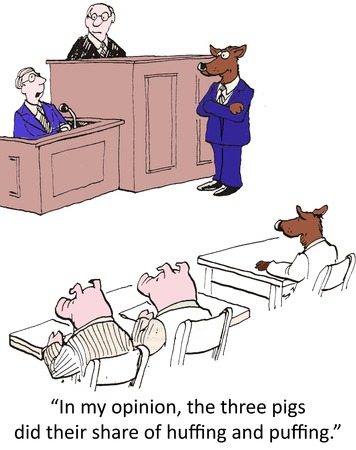
Fact and Opinion
Common Core State Standards
W.1.2 - Write informative/explanatory texts in which they name a topic, supply some facts about the topic, and provide some sense of closure.
W.2.2 - Write informative/explanatory texts in which they introduce a topic, use facts and definitions to develop points, and provide a concluding statement or section.
W.3.2b - Develop the topic with facts, definitions, and details.
W.4.2b - Develop the topic with facts, definitions, concrete details, quotations, or other information and examples related to the topic.
W.5.2b - Develop the topic with facts, definitions, concrete details, quotations, or other information and examples related to the topic.
W.6.2b - Develop the topic with relevant facts, definitions, concrete details, quotations, or other information and examples.
W.7.2b - Develop the topic with relevant facts, definitions, concrete details, quotations, or other information and examples.
W.8.2b - Develop the topic with relevant, well-chosen facts, definitions, concrete details, quotations, or other information and examples.
W.9-10.2b - Develop the topic with well-chosen, relevant, and sufficient facts, extended definitions, concrete details, quotations, or other information and examples appropriate to the audience's knowledge of the topic.
SL.2.4 - Tell a story or recount an experience with appropriate facts and relevant, descriptive details, speaking audibly in coherent sentences.
SL.3.4 - Report on a topic or text, tell a story, or recount an experience with appropriate facts and relevant, descriptive details, speaking clearly at an understandable pace.
SL.4.4 - Report on a topic or text, tell a story, or recount an experience in an organized manner, using appropriate facts and relevant, descriptive details to support main ideas or themes; speak clearly at an understandable pace.
SL.5.4 - Report on a topic or text or present an opinion, sequencing ideas logically and using appropriate facts and relevant, descriptive details to support main ideas or themes; speak clearly at an understandable pace.
SL.6.4 - Present claims and findings, sequencing ideas logically and using pertinent descriptions, facts, and details to accentuate main ideas or themes; use appropriate eye contact, adequate volume, and clear pronunciation.
SL.7.4 - Present claims and findings, emphasizing salient points in a focused, coherent manner with pertinent descriptions, facts, details, and examples; use appropriate eye contact, adequate volume, and clear pronunciation.
Search here.
114 Comments
Leave a Reply
- Author's Purpose Worksheets
- Characterization Worksheets
- Conflict Worksheets
- Fact and Opinion Worksheets
- Figurative Language Activities
- Figurative Language Poems with Questions
- Genre Activities
- Irony Worksheets
- Making Predictions
- Mood Worksheets
- Nonfiction Passages and Functional Texts
- Parts of Speech Worksheets
- Poetic Devices
- Point of View Worksheets
- School Project Ideas
- Setting Worksheets
- Simile and Metaphor Worksheets
- Story Structure Worksheets
- Text Structure Worksheets
- Theme Worksheets
- Tone Worksheets
- ALL PAGES AND WORKSHEETS





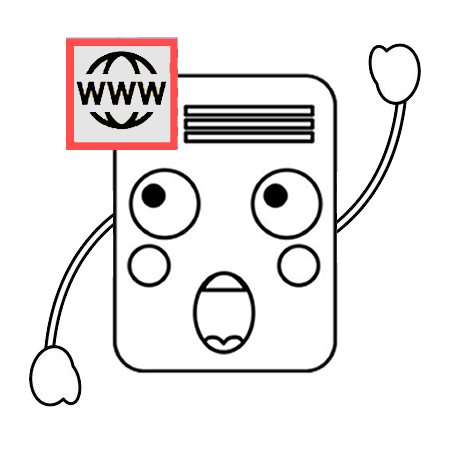

serenity shaw
/ April 18, 2023omg i love fact and opinion
Ana Wiyasa
/ February 12, 2023your material that you shared here. its very helpful to me as teacher. they can be some sources to improve my material as reading lecturer
Smart Person
/ December 4, 2022Fact- something that is true
Opinion-something that someone believes is true
Diana
/ March 19, 2021I agree that a fact is able to be proven either correct or incorrect. The weight to verifying then falls to the individual. In our current culture, we need to raise students who are able to delineate between what is written as a fact and is true, what is written as a fact and is false, and what is written as an opinion based upon fact that must be verified as either true or false before adopting it as one’s own opinion.
hilal sengenc
/ May 17, 2020thank you very much for the clarification of fact vs. opinion distinction and the worksheets.
Don Maker
/ July 13, 2017What we call “information” is everywhere. We gain information from looking at the sky, from tasting objects, from reading books. However, even most information is subjective. For example, we know from looking at a thermometer that the air is at a certain degree (either Celsius or Fahrenheit), but is the temperature warm, hot, or just comfortable? That depends on how our individual body reacts to temperature. We can measure the direction and speed of the wind, but is it a mild breeze or a stiff wind? That depends on how we react to wind, and whether we find that amount of wind to be useful (such as in sailing) or a nuisance (especially when it’s blowing in our face). We can taste a particular bottle of wine, but is the wine bitter, sweet, dry, acidic, full-bodied, or oakie? Does a dish have too much salt or not enough? That depends on our taste buds. While the information may be the same for everyone, the opinion about the information may be quite different depending on each person’s preferences.
Facts are not subject to subjectivity—which is why there are so few of them. A fact is something that can be proven, over and over and over by using different proofs. For example: Every living thing on the earth needs water to survive. Every living thing on the earth will eventually die. These are pretty well proven facts. However, what about information that may be a little less certain?
The speed of sound is 343 meters per second (1,125 ft/s). At least, it is in dry air at 20 degrees C (68 degrees F). How do we know that? Because many scientists, using different methods, have measured it. No matter who does it, or how they do it, the results always come out the same—as long as the instruments have been calibrated properly and the conditions are similar. Naturally, the speed of sound varies at different temperatures, so we must take that into account when discussing the ‘fact’ of the speed of sound. It also varies when passing through solids or liquids, so we would have to consider the circumstances as well if we wanted to be perfectly objective.
On the other hand, an object pulled by the force of gravity accelerates at 32 ft/sec/sec. The equation for the force of gravity is F = mg, with the general result being that all objects fall at the same rate, regardless of their mass. Gravity on the moon and on other planets would have different values of acceleration due to the different sizes and densites of those bodies, but the effects of the force are similar. Of course, we’re assuming no other influencing factors, such as a parachute slowing down the object due to wind resistance. So, we can pretty much take the acceleration of a falling object on Earth as a fact.
What’s a factoid? Something that sounds like a fact, but is actually only a generalization of accepted information. For example, the world is round. Really? Actually, the basic shape “approximates an oblate spheroid, a sphere flattened along the axis from pole to pole such that there is a bulge around the equator.” (Milbert, D. G.; Smith, D. A.) It also has such an irregular shape that the highest peak, Mount Everest, is 8,848 meters above local sea level and the deepest ‘canyon’ is the Mariana Trench, 10,911 meters below local sea level. Why “local”? Because even sea level varies from place to place and from time to time. ‘Sea level’ is also a factoid. The sky is blue. Well, it appears that way during certain atmospheric conditions.
Finally, to contradict Scott, I will cite Shakespeare: “There is nothing either good or bad, but thinking makes it so.” Hamlet, II,2. What you ‘know’ may be based on information, but what you think about it is merely opinion.
Scott
/ March 7, 2017The fact/opinion distinction, as used by most teachers, is hopelessly confused. The distinction can be refined but hasn’t been except by some philosophers. Also, there seems to be no clear motivation behind trying to teach this material in the first place. Finally, those of you who teach that all value judgments are mere opinion are doing the world a terrible disservice. Do you really believe that it is a matter of opinion whether it is wrong to torture a baby “just for fun”? And if you don’t think its ok for your students to cheat their way through your courses, don’t you in truth believe it is NOT just your opinion that it is wrong?
Mr. Morton
/ March 13, 2017I think that “do not torture babies” is an opinion that is held by the current majority, for very good reason. But, nonetheless, this is cultural. Aztec ceremonies could get pretty gruesome, but they did those things because they thought that they were right.
Edward Woelke
/ December 9, 2016Fact or Opinion Worksheet 1 contains a typo.
No. 7: Chicken has more protein carrots
* Chicken has more protein than carrots
marlene
/ December 6, 2016prison is one of the worst places on the planet
Mr. Morton
/ December 6, 2016That’s an opinion with which most people would agree.
nelly
/ November 28, 2016very helpful. I have a Test tomorrow. It helps me big time!
AngelaS
/ November 17, 2016I am tutoring a GED student who needs help in virtually every aspect of language arts. Your web site is an incredible resource. Thank you for all the work you’ve done to put it together. You have made this tutor’s life a lot easier, and impacted the life of at least one GED student.
Mr. Morton
/ December 6, 2016I’m so happy to hear it. Thank you for visiting and taking the time to comment. Best wishes!
Arzu Ahmed
/ October 11, 2020Thank you for help me
Chanaviea
/ September 25, 2016I need help with main idea opinions
Josh
/ August 31, 2016I’m not seeing why any of the examples of opinions cannot be proven or verified. Is there a proof which establishes that no ethical or aesthetic statements are provable? I’ve never seen one myself. Should we conclude, then, that the classification of such statements as opinions is itself an opinion?
Someone might think ethical statements are “opinions” because they are purely *subjective*. But subjectivity doesn’t entail that there can’t be a proof. (The proof would simply be about a particular subject.)
Dana Alap
/ August 23, 2016Very helpful and meaningful work. use the worksheets for my students. Tq Mr Morton.
Terra Cooley
/ April 15, 2016Thank you so much for this site. I wish I would have known about your site all year. I normally teach math, so I need all the help I can get with Language.
Mr. Morton
/ April 18, 2016I’m so happy to help. Best wishes!
Deokie Rattan
/ March 16, 2016Thank you for these activities. they are really helplful and works in the classroom. I appreciate your work and what you are doing for teachers
who just starts their career. May God continue to bless your administration and provide bountifully so that you all can achieve your goal and continue to be a blessing to millions of teachers.
Mr. Morton
/ May 18, 2016Thank you for the blessings.
bob
/ March 9, 2016cool thanks for the facts i guess 8)
A. Peterson
/ November 17, 2015Thank you for these activities. I have been using these in my introductory reading classes at three different community colleges. They really help students focus on biased language and spotting when an author’s personal bias has crept into an otherwise “factual” statement. Objective vs. Subjective is a big challenge for some students, especially now that “news” can come from a variety of heavily-biased sources and still be called “factual”. When we use these sheets in particular, I have to remind the students that it is NOT True-False, but rather focusing on whether it is stated factually (as in “Can it be verified?”) It seems that even some of your critics posting above struggle with this idea. Yes, as teachers we would promote the message that “Copying homework is wrong”, but this is not a fact. What is “wrong” is completely subjective – The kid who makes it through college by copying others’ work may face some comeuppance, but should he or she succeed and move into a successful career, they may be hard-pressed to deem what they did as “wrong”. In short, factual statements can be verified and require one answer. The opinions have varied answers “depending on who you ask”. My students totally get this. Let’s be realistic – if I tell my 18-year old students that “Copying homework is wrong” is not a fact, it’s not exactly going to shake civilization to its very foundations. Get over your selves.
Mr. Morton
/ November 18, 2015Thank you for your contribution to the discussion.
Mary
/ November 11, 2015Thank you so much for the wonderful website, everything is helpful.. I am a college student, yet I learned so much . If you could add more complex lvl worksheets, it would be great.
George Biscuit
/ September 8, 2015Thanks for the materials and your time. I appreciate your attitude in dealing with the vitriolic posters at the beginning of the thread. Thank you for staying civil and not getting baited into a pointless back and forth. Keep it classy!
Mr. Morton
/ September 11, 2015Thank you.
Jonas
/ September 3, 2015I am having a really hard time refraining from bad language etc etc. In the article you say:
“In my experience I’ve found that students often get confused trying to determine whether a statement is factually accurate, and that is not the skill that is evaluated. Therefore, I teach students that a fact is any statement that can be proven: “there are 10,000 feet in a mile.” Even though this statement is incorrect, I teach students that this is still a fact, even though it is not true.”
This is SO bad. You are teaching incorrect things to your students and you are doing a disservice to them and everyone else they will interact with. SHAME ON YOU.
A fact is a true statement, that has already been proven. NOT a statement which could either be true or false or that may be proven in the future but hasn’t yet. (this is a fact that you can verify by checking a dictionary)
As an educator, I would hope you were not only aware of these various terms and their different meanings but would do more then simply take a very poor short cut to try to get a better test result regardless of how that education will or could actually be used or weather the method you are teaching them is correct. Process is important and as an educator I shouldn’t have to explain that to you.
When someone communicates something that could be true or false and which therefore hasn’t been proven or dis-proven yet then it is simply a statement, or maybe a theory. Statements are capable of being true or false. Statements or premises can be opinions but until they are proven true they cannot be facts.
JUST WOW. SO SAD…
Mr. Morton
/ September 4, 2015Thank you for your contribution to the ongoing discussion.
Brian
/ August 14, 2015Thank you so much for posting these worksheets. They are fantastic for helping students learn the basics about “facts” and “opinions”.
Jeff
/ June 13, 2015What do you mean by “proven?”
Joel
/ June 4, 2015I find it disturbing that someone who is not educated in (or even aware of) the underlying philosophical problems associated with this content is attempting to teach it.
“…a fact is any statement that can be proven…”
This statement cannot be proven. Hence, by your own argumentation, it is an opinion. Opinions should not be taught as though they are factual.
Your teachings on this matter (like all logical positivism) is self-refuting.
Objective statements can be true or false.
Statements of personal opinion can be true or false.
To attempt to teach that objective statements are “factual” in nature and opinion statements cannot be true or false is a philosophically sophomoric error.
Mr. Morton
/ June 8, 2015I can’t argue your logic, but I feel as though people are missing the spirit of my instruction in that it helps students answer such questions with reliable accuracy.
Jonas
/ September 3, 2015“I can’t argue your logic, but I feel as though people are missing the spirit of my instruction in that it helps students answer such questions with reliable accuracy.”
I don’t think anyone is missing the “spirit” of your instruction. You are prioritizing a test score rather then a usable education that represents effectively applied knowledge or the ability to effectively apply knowledge.
Now your students have to go unlearn what you taught them if they want to have a real understanding of those terms or issues or if they want to be able to make effective evaluations of, for example, politicians and reports who make a lot of statements and claim fact without the evidence or proof to back up their claims.
Mr. Morton
/ September 4, 2015Thank you for contributing to the conversation.
Seth
/ May 1, 2015Mr Morton: please tell me that you’re not both this flagrantly wrong and teaching the next generation at the same time. A fact is by definition something that is true. Worse, by your definition, it would seem that prior to the advent of the telescope, it wasn’t a fact that the Earth revolved around the sun. After all, it wasn’t “provable.” I implore you to please, please consult with a philosopher before propounding more fallacious reasoning to our kids.
Don Maker
/ July 13, 2017Sorry, but you are wrong. “Truth” is whatever a person believes. A “fact” is what can be proven over and over. Just because heliocentrisim could not at that time be proven, was it not a fact?
Rustin
/ April 30, 2015Thank you so much for your website and worksheets. I practice numerous skills from your site with my students often. I think you have done a great job!
Gerry
/ April 3, 2015What all this does prove is the fact that you are a bunch of educated idiots.